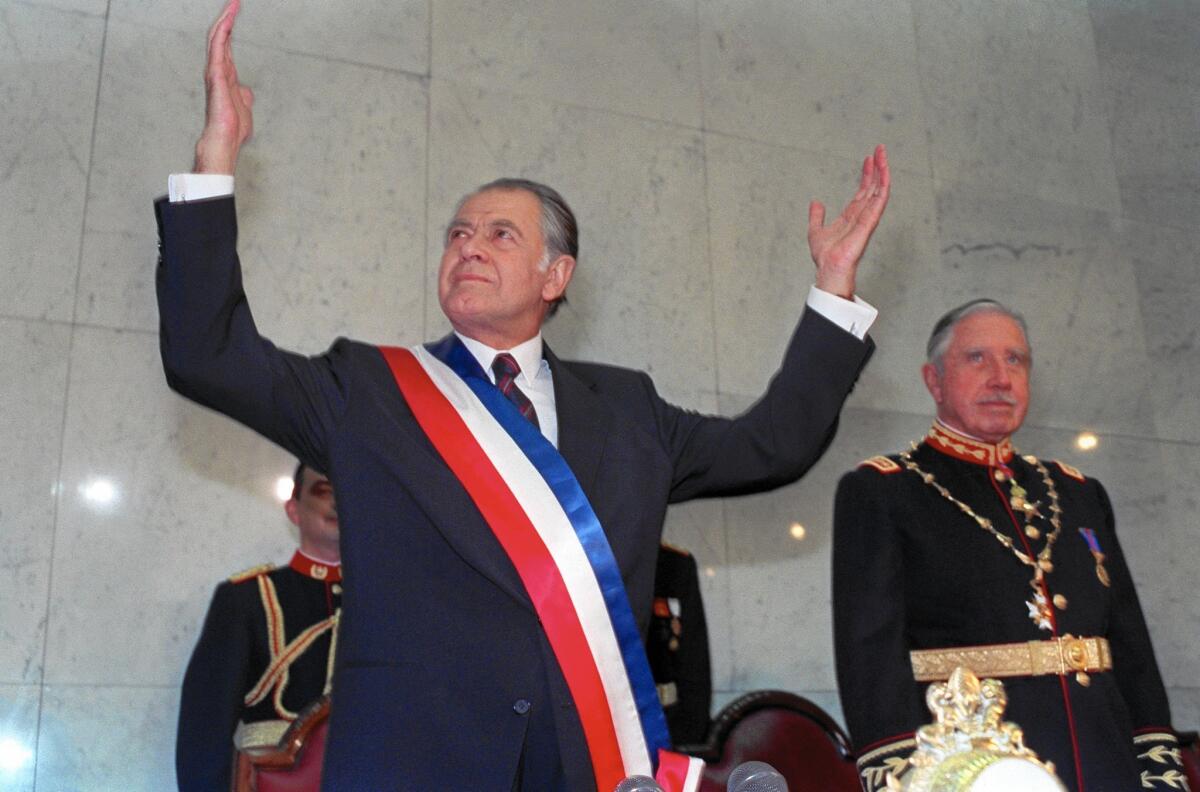Patricio Aylwin dies at 97; Chilean president consolidated fragile democracy after Pinochet’s rule

Patricio Aylwin, left, speaks after receiving the presidential sash at inaugural ceremonies in Santiago, Chile, in March of 1990 as outgoing President Augosto Pinochet looks on.
- Share via
SANTIAGO, Chile — Patricio Aylwin, Chile’s first elected president after the bloody 17-year Pinochet dictatorship, took office in 1990 at an extremely delicate moment in his country’s history.
Gen. Augusto Pinochet had left La Moneda presidential palace after losing a 1988 plebiscite to retain power, but kept command of the armed forces. That raised fears he might try another coup to regain power, similar to the one in 1973 that overthrew leftist President Salvador Allende.
That Aylwin, who died Tuesday at his Santiago home at the age of 97, was able to keep opposition parties united during his 1990-1994 term in office while controlling the restive military, is widely considered by Chilean historians as a monumental act of political skill.
Another signal moment in national reconciliation was Aylwin’s public apology in 1991 for human rights abuses committed under the Pinochet regime. It came in a televised address after he received the Truth and Reconciliation report from a panel that he appointed to investigate the junta’s reign of terror.
Aylwin won the presidency by forming an alliance between his centrist Christian Democratic Party and several left-wing parties. The alliance was called Concertacion, or Agreement, and its candidates won the presidency three more times after he left office, a string broken only in 2010 when Sebastian Pinera of the center-right Alliance for Chile party was elected.
The Pinochet dictatorship is thought to have killed or “disappeared” 3,065 Chileans, most of them left-wing dissidents. An additional 37,000 were arrested, tortured or forced into exile. Allende died in the presidential palace during the September 1973 coup, apparently by suicide.
The deft political management of Aylwin, who initially seemed to favor the coup but later became a staunch opponent of Pinochet, focused on generating broad agreements between left- and right-wing parties to consolidate the then-fragile democracy in Chile.
“I admired President Aylwin for his ability to maintain the delicate balance between political and military leaders,” said Curtis Kamman, former U.S. ambassador to Chile. “He displayed similar discretion in refusing to chastise the United States’’ for its suspected support of the 1973 coup.
Kamman added that Aylwin’s free-market economic policies, despite opposition from those who favored a return to Allende’s socialist agenda, set the stage for Chile’s dramatic economic growth over the last two decades.
In a statement issued Tuesday, Chilean President Michelle Bachelet, who was herself arrested during the junta, said Aylwin “opened the way for us to return to full democracy.” She also declared three national days of mourning in his honor.
“Chile has lost a man who always knew how to place the unity of democrats above their differences, which helped him build a democratic country,” Bachelet said.
Former President Pinera issued a statement Tuesday saying that Aylwin “played a key role in the exemplary manner in which Chile regained its democracy.”
After a funeral cortege through streets of Santiago, Aylwin will lie in state on Thursday in the Metropolitan cathedral of Santiago before a full state funeral Friday.
Patricio Aylwin Azocar was born Nov. 26, 1918. A law professor by profession, Aylwin was already an experienced politician when he took office as president. He had been president of his Christian Democratic Party and then was president of the Senate in the early 1970s.
During his time in office, Aylwin also faced the enormous task of restoring Chile’s damaged relations with other countries. U.S. ties had been strained by the 1976 killing of Allende’s former foreign minister, Orlando Letelier and his American assistant Ronni Moffitt, in a 1976 car bomb in Washington.
A U.S. investigation found that Chilean secret police were behind the assassination. After leaving office, Aylwin kept a low profile. He remained active in his party and gave occasional interviews, but wrote no memoire and ruled out public office.
As Aylwin’s health failed in recent days, his home in the middle-class neighborhood of Providencia in Santiago became a point of pilgrimage for politicians to pay their respects.
“His life and legacy is a lesson for Chile,” said former President Ricardo Lagos.
Poblete is a special correspondent. Special correspondent Chris Kraul in Bogota, Colombia contributed to this report.
More to Read
Start your day right
Sign up for Essential California for the L.A. Times biggest news, features and recommendations in your inbox six days a week.
You may occasionally receive promotional content from the Los Angeles Times.




